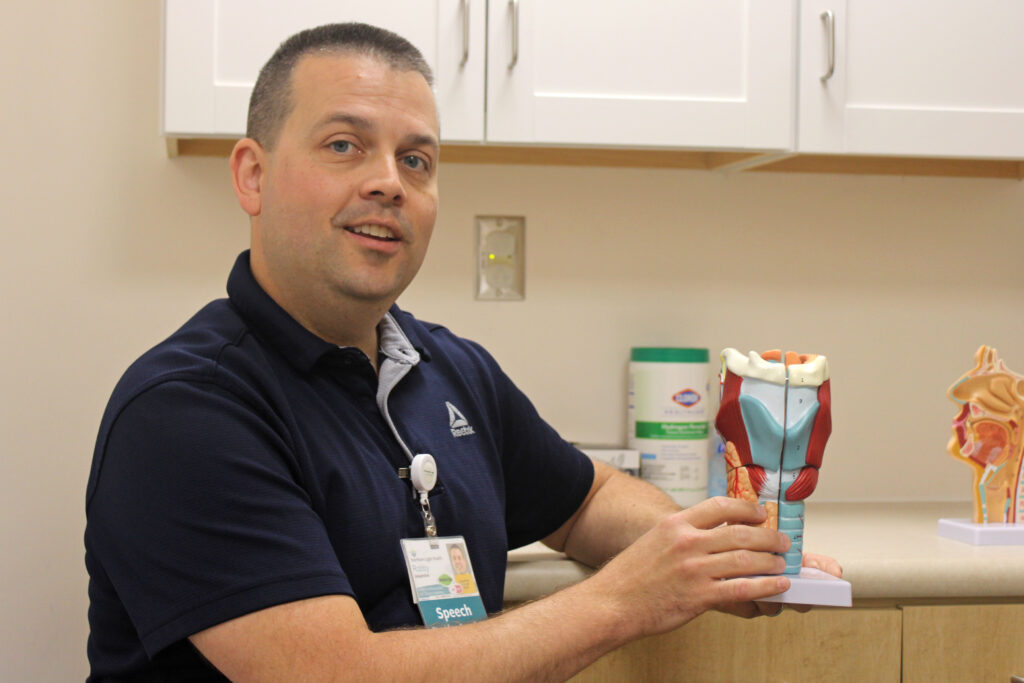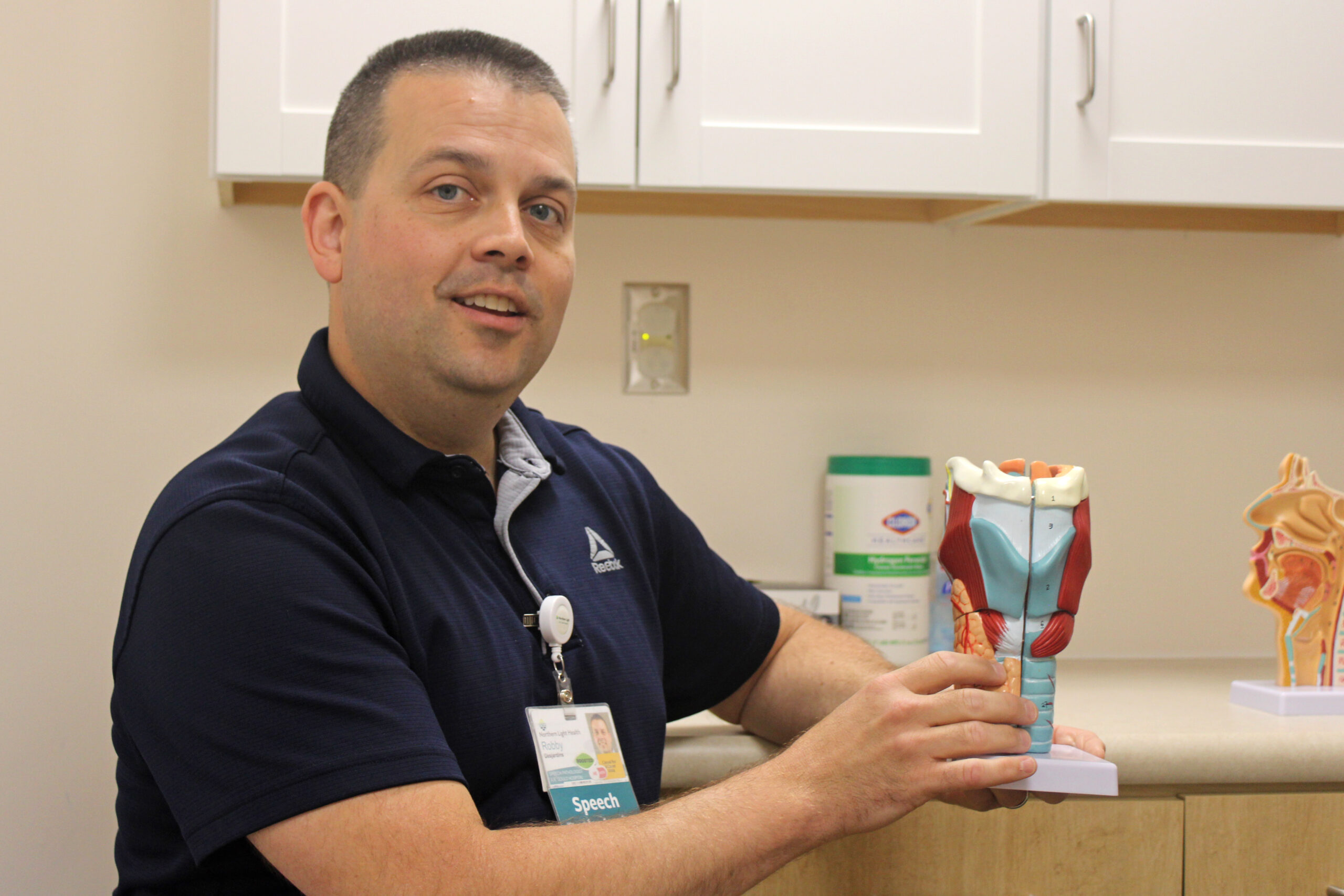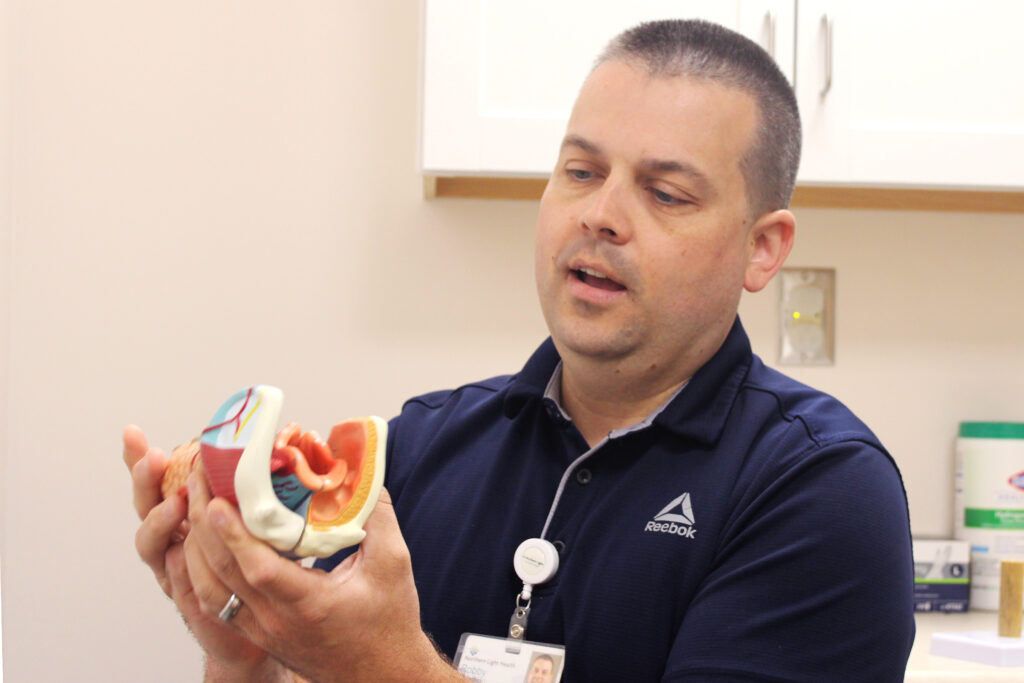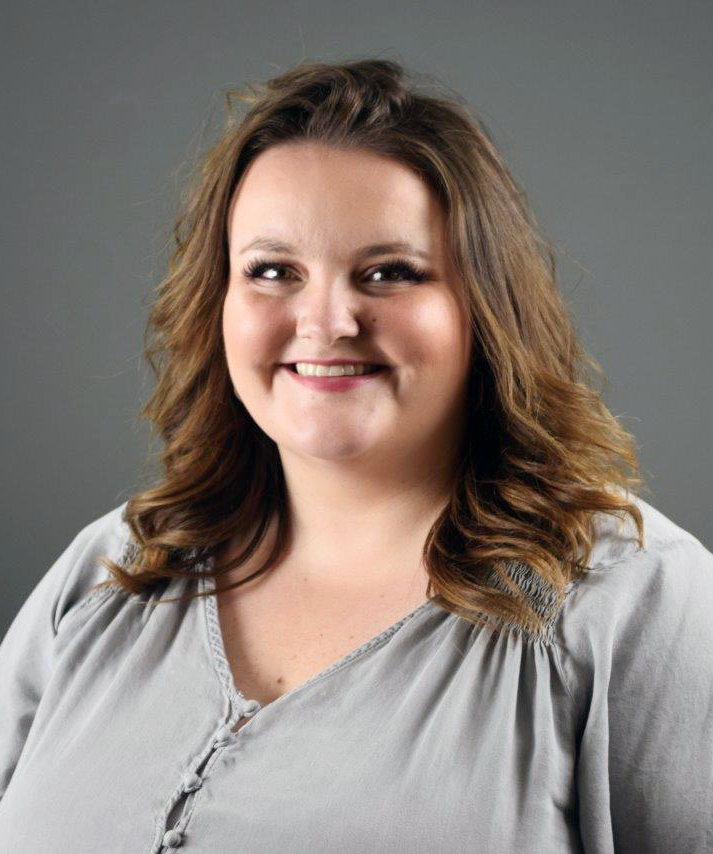A Presque Isle hospital is helping transgender Maine residents find their voice


Speech therapist Robby Desjardins holds a larynx model as he explains the anatomy of the vocal cords. Desjardins is a pioneer of gender-affirming voice therapy at Northern Light AR Gould Hospital in Presque Isle. (Paula Brewer | The Star-Herald)
In a small clinic at Northern Light AR Gould Hospital in Presque Isle, people learn new ways of speaking that correspond to their gender identity.
Speech therapist Robby Desjardins accompanies his clients, many of whom are transgender, on a complex and sometimes emotional journey to retrain their voice.
Gender-affirming voice therapy helps people express themselves more authentically, but it can also prevent other people from misidentifying their gender — what Johns Hopkins calls “misgendering.” Desjardins’ program is the first in Aroostook County and one of only a few in Maine, and his growing client list spans the entire state.
When people can show who they are on the inside, it builds their confidence and improves their lives, he said.
“There’s less stigma when your voice matches your identity. A lot of it up here has to do with community safety,” Desjardins said. “People still have very harsh views about the trans community. So it’s more than just an identity issue; it’s a safety and quality of life issue.”

The therapy has been around for about 20 years, but not many people practice it in Maine, said Desjardins. He joined AR Gould in 2019 and started the program in 2020.
According to a 2022 study, there are an estimated 5,900 transgender adults and 1,200 transgender youth in Maine.
The Scarborough NeuroDevelopment Center offers voice therapy for transgender people. Maine Family Planning in Portland offers transgender health care but not voice training, and even refers many patients to the Presque Isle program, Desjardins said.
Demand has increased so much that speech therapist Jada Kuhn joined the team. The two provide telemedicine care to many patients both in Presque Isle and across Maine.
Certain speech patterns are generally male or female, Desjardins said. Men typically speak sharper and more choppy with shorter syllables, while women tend to draw out syllables and use softer tones that rise and fall.
Different clients have different needs. A woman transitioning her gender may want to develop a deeper voice with more bass and a more monotone pattern. Someone who is nonbinary may want a speaking pattern that is neither male nor female.
Others want a different voice for specific reasons, he said. For example, someone may want to reflect their previous gender in order to speak to their children who knew them before gender reassignment.
Desjardins works with a client to set goals and then develops exercises for various physical qualities such as resonance, articulation, pitch and intonation. He also works on nonverbal communication, which includes laughing and coughing.
For a male voice, the back of the throat may be responsible for a deeper sound, while for a female speaker, the voice may come from the front of the mouth, producing a brighter sound, he said.
“We teach people to make their instruments smaller if they want a brighter voice and bigger if they want a deeper voice,” Desjardins said. “We can’t change a person’s body, but we can change how they use their muscles.”

The therapy requires commitment. Treatment involves about 20 sessions and a lot of patience and practice, he said. He incorporates games and fun scenarios to make things fun, and even smartphone apps for voice training. But if people aren’t willing to put in some work between sessions, they’re not as successful.
For patient Kiradwen Libby, the results were transformative. She works in customer service, deals with people on the phone and was almost always addressed incorrectly. She sought help from the therapy team.
It was a lot of work, but it was worth it, she says. Thanks to the guidance and exercises she did, it’s now rare for someone to mistake her gender. She attributes her success to Desjardins’ program.
“He really cares about us as individuals and wants to equip us with the tools we need to achieve our goal of making our voices sound more authentic to our gender,” Libby said.
She also recently started working with Kuhn and said Kuhn found unconventional ways to create helpful exercises for her.
A big part of the process is counseling and helping patients overcome these hurdles, Desjardins said.
It’s not always easy. Patients often have to go through a lot, whether it’s the difficulties of gender transition, family problems or even homelessness. Transgender people can have trouble finding work because some employers are hesitant to hire people outside the gender norm, he said.
Success comes when people go about their daily lives and are accepted as the gender they choose. Although he enjoys his work, Desjardins especially enjoys helping people stay true to themselves.
“The greatest reward is when someone tells me they were able to make a call without being addressed incorrectly, mocked or given a funny look,” he said. “I want people to smile and feel good about what they’re saying and how they’re saying it.”



